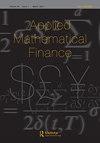退休储蓄的最优资产配置:确定性与时间一致的自适应策略
Q3 Mathematics
引用次数: 18
摘要
我们考虑投资者为退休储蓄的最优资产配置。投资组合包括债券指数和股票指数。我们使用多期标准并探索了两种类型的策略:确定性策略仅基于到预期退休日期的剩余时间,而适应性策略也考虑投资者的累积财富。绝大多数为退休储蓄而设计的金融产品使用确定性策略(例如,目标日期基金)。在确定性情况下,我们使用均值-方差准则确定最优开环控制。在自适应情况下,我们使用时间一致的均值方差和二次短缺目标。基于跳跃-扩散过程建模的综合市场和长期历史数据的自举重采样的测试表明,最优自适应策略显著优于最优确定性策略。这表明,目前主导市场的策略并没有很好地服务于投资者。本文章由计算机程序翻译,如有差异,请以英文原文为准。
Optimal Asset Allocation for Retirement Saving: Deterministic Vs. Time Consistent Adaptive Strategies
ABSTRACT We consider optimal asset allocation for an investor saving for retirement. The portfolio contains a bond index and a stock index. We use multi-period criteria and explore two types of strategies: deterministic strategies are based only on the time remaining until the anticipated retirement date, while adaptive strategies also consider the investor’s accumulated wealth. The vast majority of financial products designed for retirement saving use deterministic strategies (e.g., target date funds). In the deterministic case, we determine an optimal open loop control using mean-variance criteria. In the adaptive case, we use time consistent mean-variance and quadratic shortfall objectives. Tests based on both a synthetic market where the stock index is modelled by a jump-diffusion process and also on bootstrap resampling of long-term historical data show that the optimal adaptive strategies significantly outperform the optimal deterministic strategy. This suggests that investors are not being well served by the strategies currently dominating the marketplace.
求助全文
通过发布文献求助,成功后即可免费获取论文全文。
去求助
来源期刊

Applied Mathematical Finance
Economics, Econometrics and Finance-Finance
CiteScore
2.30
自引率
0.00%
发文量
6
期刊介绍:
The journal encourages the confident use of applied mathematics and mathematical modelling in finance. The journal publishes papers on the following: •modelling of financial and economic primitives (interest rates, asset prices etc); •modelling market behaviour; •modelling market imperfections; •pricing of financial derivative securities; •hedging strategies; •numerical methods; •financial engineering.
 求助内容:
求助内容: 应助结果提醒方式:
应助结果提醒方式:


